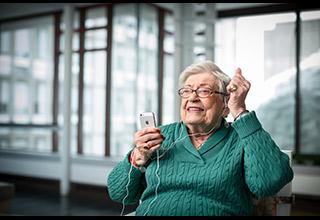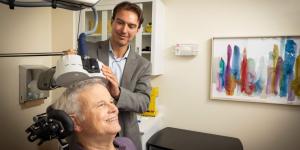Music and Memory Services Comfort Patients with Dementia
New research is confirming and expanding an idea long held by those who work with Alzheimer’s and dementia patients: music has a way of invoking memory.

How many times have you heard a song and gotten a strange sense of déjà vu? With even just a few notes played, you are reminded of people, places, and events you may not have thought about for years. New research is confirming and expanding an idea long held by those who work with Alzheimer’s and dementia patients: music has a way of invoking memory.
Regina Dain, Music Therapist at Hebrew SeniorLife, says the music memory connection is due to the unique way our brains process music, “Music has the ability to bypass cognition. Patients who may not be able to form sentences can recognize tunes and remember lyrics in their entirety,” Dain explained. Music is the perfect outlet for those with Alzheimer's or dementia because it can help to shift feelings from negative to positive, reduce stress, and create positive interactions. Because music requires less mental processing, it serves as the perfect activity for someone who is suffering from reduced cognitive function to remain engaged and stimulated.
Music and Memory is a relatively new trend in dementia care. Individualized playlists and mp3 players are utilized to stimulate patients’ ability to reminisce, sing, move to music, and feel an overall better connection to their environment. It improves patient’s mood and decreases unwanted behavioral symptoms.
Dain says that she has already observed how individualized music listening makes a significant impact on some patients, “One symptom of dementia is vocalizations which are often a sign of anxiety or agitation. However, when patients put the headphones on, they calm down. The change is almost immediate.”
Music and Memory is a new multidisciplinary, technology-based program -- supported in part by the Merck Foundation -- that Hebrew SeniorLife offers to its patients in addition to a full spectrum of expressive therapies: music, movement, art, and bibliotherapy. All of these therapies provide support to patients whose cognitive and verbal abilities are impaired. Research has shown that music helps the brain to focus and to stay in alignment, thus decreasing feelings of confusion and disconnection.
Blog Topics
Learn More
Free Guide to Brain Health
Download our free guide, “Optimizing Your Brain Health,” for expert advice on boosting brain health at any age. Explore practical tips and resources from Hebrew SeniorLife’s Deanna and Sidney Wolk Center for Memory Health.

Long-Term Chronic Care
Hebrew Rehabilitation Center provides person-centered extended medical care in a homelike setting for patients with chronic illness. As a licensed long-term chronic care hospital, we provide higher-level, more comprehensive medical care to older adults than a traditional nursing home.




